小升初英语常考句型
- 格式:docx
- 大小:24.90 KB
- 文档页数:13
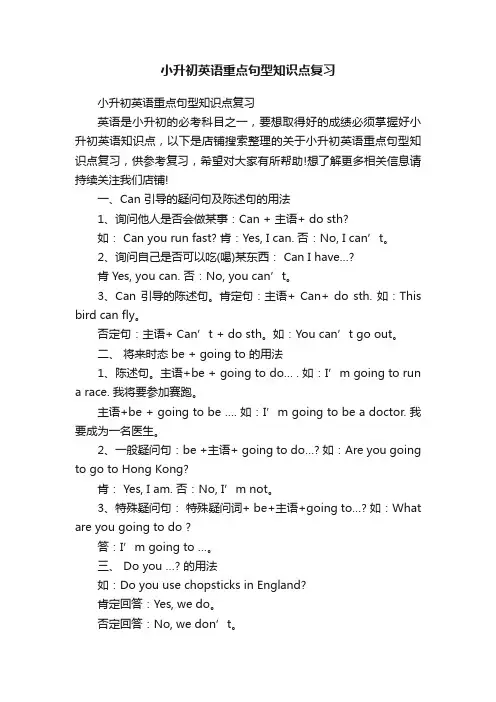
小升初英语重点句型知识点复习小升初英语重点句型知识点复习英语是小升初的必考科目之一,要想取得好的成绩必须掌握好小升初英语知识点,以下是店铺搜索整理的关于小升初英语重点句型知识点复习,供参考复习,希望对大家有所帮助!想了解更多相关信息请持续关注我们店铺!一、Can 引导的疑问句及陈述句的用法1、询问他人是否会做某事:Can + 主语+ do sth?如: Can you run fast? 肯:Yes, I can. 否:No, I can’t。
2、询问自己是否可以吃(喝)某东西:Can I have…?肯 Yes, you can. 否:No, you can’t。
3、Can 引导的陈述句。
肯定句:主语+ Can+ do sth. 如:This bird can fly。
否定句:主语+ Can’t + do sth。
如:You can’t go out。
二、将来时态be + going to 的用法1、陈述句。
主语+be + going to do… . 如:I’m going to runa race. 我将要参加赛跑。
主语+be + going to be …. 如:I’m going to be a doctor. 我要成为一名医生。
2、一般疑问句:be +主语+ going to do…? 如:Are you going to go to Hong Kong?肯: Yes, I am. 否:No, I’m not。
3、特殊疑问句:特殊疑问词+ be+主语+going to…? 如:What are you going to do ?答:I’m going to …。
三、Do you …? 的用法如:Do you use chopsticks in England?肯定回答:Yes, we do。
否定回答:No, we don’t。
这个句型是在询问某人是否做某事的情况下用的,在回答这类疑问句时,注意人称和肯定、否定用法就可以了。
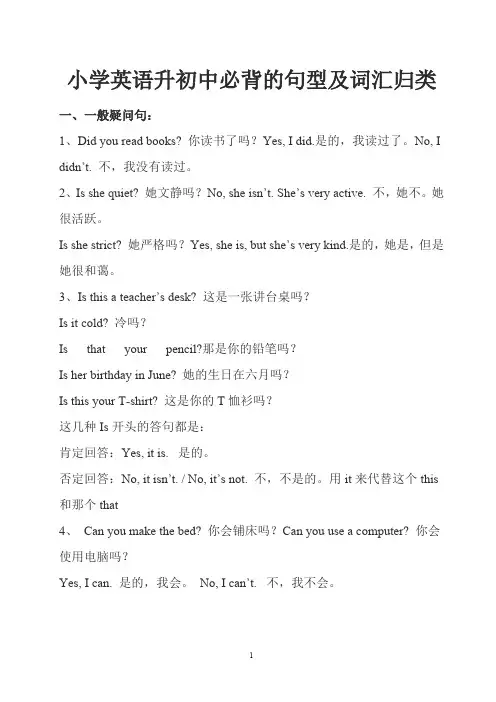
小学英语升初中必背的句型及词汇归类一、一般疑问句:1、Did you read books? 你读书了吗?Yes, I did.是的,我读过了。
No, I didn’t. 不,我没有读过。
2、Is she quiet? 她文静吗?No, she isn’t. She’s very active. 不,她不。
她很活跃。
Is she strict? 她严格吗?Yes, she is, but she’s very kind.是的,她是,但是她很和蔼。
3、Is this a teacher’s desk? 这是一张讲台桌吗?Is it cold? 冷吗?Is that your pencil?那是你的铅笔吗?Is her birthday in June? 她的生日在六月吗?Is this your T-shirt? 这是你的T恤衫吗?这几种Is开头的答句都是:肯定回答:Yes, it is. 是的。
否定回答:No, it isn’t. / No, it’s not. 不,不是的。
用it来代替这个this 和那个that4、Can you make the bed? 你会铺床吗?Can you use a computer? 你会使用电脑吗?Yes, I can. 是的,我会。
No, I can’t. 不,我不会。
5、Are they ducks? 它们是鸭子吗?Are they eating the honey? 它们吃蜂蜜吗?Are those your shoes? 那是你的鞋子吗?Are these your pants? 那是你的裤子吗?这几种句型的回答都是:肯定回答:Yes, they are. 是的,它们是。
否定回答:No, they aren’t. 不,它们不是。
用they来代替这些these和那些those6、Is there a forest in the park? 公园里有一个森林吗?Is there a river?那里有条河吗?Yes, there is. 是的,那里有。
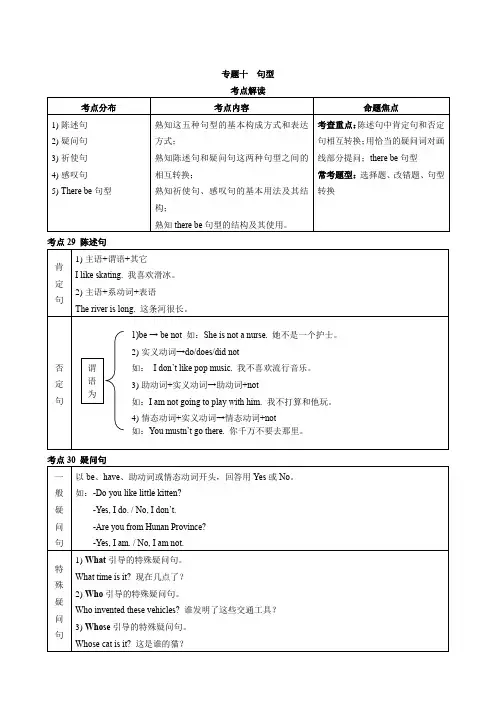
专题十句型考点29 陈述句考点30 疑问句考点31 祈使句考点32 感叹句【经典分析】【例1】I have some pens.(把肯定句改成否定句)[思路指导]句意:我有一些笔。
此句中,have是谓语动词。
变成否定句时,在have前加do的相应否定形式。
主语是第一人称I,所以在have前加do not。
并注意some用在肯定句,否定句中要换成any。
[参考答案]I don’t have any pens.【例2】-Are you new interns(实习生)?-Yes, .A. they areB. you areC. I amD. we are[思路指导]句意:你们是新的实习生吗?是的,我们是。
此句中,主语是you,可以译为你或你们,所以肯定回答中的主语是I或we。
然后,在句的末尾出现的表语为名词复数interns,由此可以判断出主语为we。
[参考答案]D【例3】play chess.A. LetB. Let meC. LetsD. Let’s[思路指导]句意:我们一起下象棋吧。
由句意可以看出是在提议作某件事情,并且可以看出宾语不是一个人,而是多个人。
因而要用Let us,其缩写形式为Let’s。
[参考答案]D【例4】heavy rain it was!A. WhatB. What aC. HowD. How a[思路指导]句意:好大的一场雨啊!根据题干中结构heavy rain it was=形容词+名词+主语+谓语,可以判断出该感叹语有what引导。
所以答案在A和B之间产生。
rain在这里是可数名词,译为一场雨。
所以应该在what后面加a。
[参考答案]B【例5】There a boy and three girls in the team.A. isB. areC. amD. be[思路指导]句意:队里有一个男孩和三个女孩。
根据就近原则,There be句子中有两个或两个以上主语时,be与最靠近的主语保持一致。
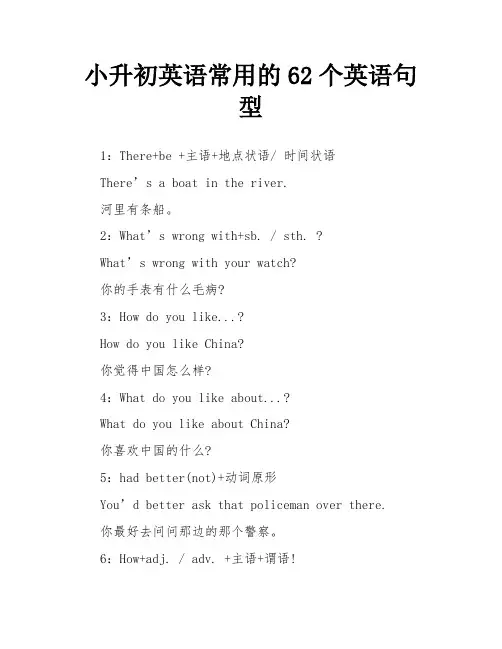
小升初英语常用的62个英语句型1:There+be +主语+地点状语/ 时间状语There’s a boat in the river.河里有条船。
2:What’s wrong with+sb. / sth. ?What’s wrong with your watch?你的手表有什么毛病?3:How do you like...?How do you like China?你觉得中国怎么样?4:What do you like about...?What do you like about China?你喜欢中国的什么?5:had better(not)+动词原形You’d better ask that policeman over there.你最好去问问那边的那个警察。
6:How+adj. / adv. +主语+谓语!What a/ an+adj. +n. +主语+谓语!How cold it is today !今天多冷啊!What a fine picture it is!多美的一幅图画呀!7:Thank+sb. +for(doing)sth.Thank you for ing to see me.感谢你来看我。
8:So+be/ 情态动词/ 助动词+主语He is a student. So am I.他是一个学生,我也是。
9:... not ... until ...He didn’t have supper until his parents came back.直到他的父母回来他才吃饭。
10:比较级+and+比较级The baby cried harder and harder.那孩子哭得越来越厉害。
11:the +比较级,the +比较级The more one has,the more one wants.越有越贪。
12:... as +adj./ adv.+as ...…not as(so) +adj. / adv. +as ...Do you think that art is as important as music?你认为艺术和音乐一样重要吗?Last Sunday the weather was not so wet as it is today.上个星期天的天气不如今天的天气潮湿。
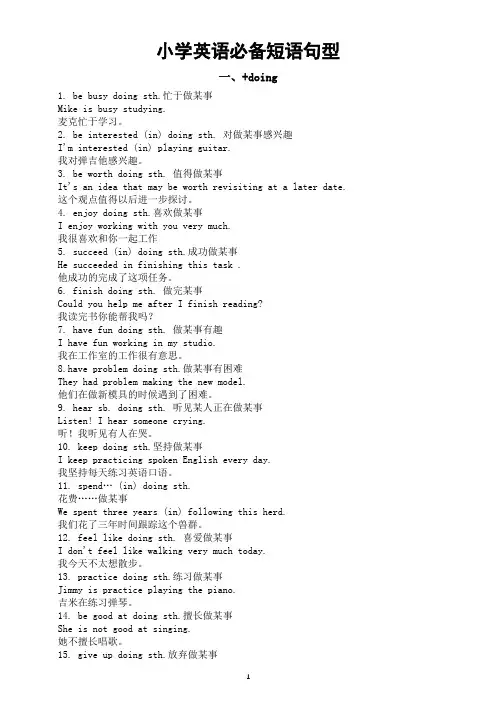
小学英语必备短语句型一、+doing1. be busy doing sth.忙于做某事Mike is busy studying.麦克忙于学习。
2. be interested (in) doing sth. 对做某事感兴趣I'm interested (in) playing guitar.我对弹吉他感兴趣。
3. be worth doing sth. 值得做某事It's an idea that may be worth revisiting at a later date. 这个观点值得以后进一步探讨。
4. enjoy doing sth.喜欢做某事I enjoy working with you very much.我很喜欢和你一起工作5. succeed (in) doing sth.成功做某事He succeeded in finishing this task .他成功的完成了这项任务。
6. finish doing sth. 做完某事Could you help me after I finish reading?我读完书你能帮我吗?7. have fun doing sth. 做某事有趣I have fun working in my studio.我在工作室的工作很有意思。
8.have problem doing sth.做某事有困难They had problem making the new model.他们在做新模具的时候遇到了困难。
9. hear sb. doing sth. 听见某人正在做某事Listen! I hear someone crying.听!我听见有人在哭。
10. keep doing sth.坚持做某事I keep practicing spoken English every day.我坚持每天练习英语口语。
11. spend… (in) doing sth.花费……做某事We spent three years (in) following this herd.我们花了三年时间跟踪这个兽群。
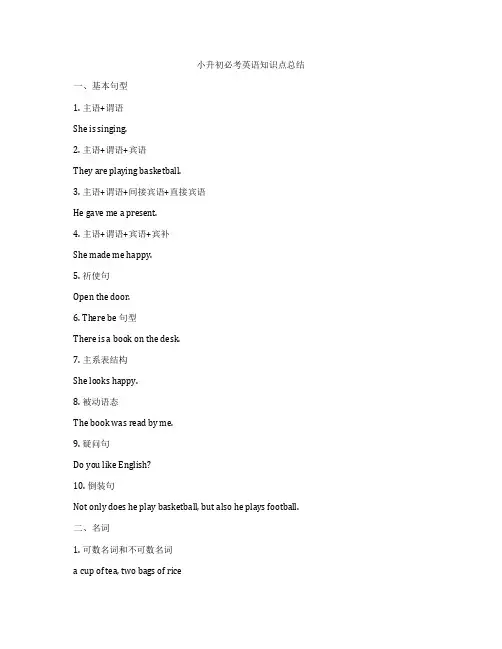
小升初必考英语知识点总结一、基本句型1. 主语+谓语She is singing.2. 主语+谓语+宾语They are playing basketball.3. 主语+谓语+间接宾语+直接宾语He gave me a present.4. 主语+谓语+宾语+宾补She made me happy.5. 祈使句Open the door.6. There be 句型There is a book on the desk.7. 主系表结构She looks happy.8. 被动语态The book was read by me.9. 疑问句Do you like English?10. 倒装句Not only does he play basketball, but also he plays football.二、名词1. 可数名词和不可数名词a cup of tea, two bags of rice2. 名词的所有格my father's car3. 名词的单复数a book, two books4. 特殊名词的复数形式child-children, woman-women5. 特殊名词的不可数名词形式news, information6. 特殊名词的复合名词形式forget-me-not, passer-by三、冠词1. 定冠词和不定冠词a book, the book2. 不加冠词的情况He is a student.3. 特殊用法once upon a time四、代词1. 人称代词I, you, he, she, it, we, they2. 物主代词my, your, his, her, its, our, their3. 反身代词myself, yourself, himself, herself, itself, ourselves, themselves 4. 特殊用法one another, each other五、动词1. 一般现在时He plays basketball every day.2. 一般过去时I played computer games yesterday.3. 一般将来时I will go to the park tomorrow.4. 现在进行时She is reading a book now.5. 过去进行时He was playing basketball at this time yesterday.6. 情态动词can, may, must, should, need7. 动词的不定式to do, to be8. 动词的-ing形式reading, playing9. 动词的完成时I have read that book.10. 动词的被动语态The book was read by me.11. 及物动词和不及物动词I like singing.六、形容词和副词1. 形容词的比较级和最高级big-bigger-biggest2. 副词的用法She sings well.3. 物主形容词my, your, his, her, its, our, their4. 特殊形容词和副词good-better-best, well-better-best七、介词1. in, on, at的用法in the classroom, on the desk, at home2. 特殊介词的用法under, over, between, among3. 介词短语in front of, next to, to the left of4. 介词词组on time, in time八、连词1. and, but, or的用法She likes playing basketball and football.2. because, so的用法He is tired because he works hard.3. 特殊连词的用法either...or, neither...nor, not only...but also...九、数词1. 基数词和序数词one, first2. 特殊数词的用法the first of October, one and a half 3. 特殊用法three times a week, two hours' time十、时间1. 日常时间的表达at seven o'clock, in the morning2. 一般现在时表示的未来情况I leave for Beijing tomorrow.3. 特殊时间状语的用法last Sunday, next Tuesday十一、情态动词1. can, may, must, shouldI can swim.2. 特殊情态动词的用法would like, need3. 特殊用法had better, have to十二、虚拟语气1. if引导的虚拟条件句If I were you, I would go now.2. wish引导的虚拟句I wish I were a bird.3. 特殊用法It's high time, If only十三、疑问句和感叹句1. 一般疑问句Do you like English?2. 特殊疑问句What's your name?3.感叹句What a nice day it is!四、定语和被定语1. 定语的位置和形式the red book, the book on the desk2. 被定语的位置和形式a city of the world, a boy with big eyes3. 特殊用法a cup of tea, the mother of all rivers 十五、主谓一致1. 就近原则Neither she nor I am good at singing.2. 特殊用法There be 句型十六、宾语从句1. 特殊宾语从句的引导词I know who the man is.2. 特殊宾语从句的时态I think he will come soon.十七、主语从句1. 特殊主语从句的引导词What you have said is true.2. 特殊主语从句的时态It's clear that they have won the game. 十八、定语从句1. 特殊定语从句的引导词The boy who is swimming is my friend.2. 特殊定语从句的时态I have lost the pen that you gave me.十九、状语从句1. 时间状语从句When the bell rang, we stopped working.2. 地点状语从句Where there is a will, there is a way.3. 原因状语从句Because he was ill, he didn't go to work.4. 条件状语从句If I were you, I would go now.5. 结果状语从句It's so late that we can't go out.六、语音1. 单词中元音的发音cake, team2. 单词中辅音的发音break, cream3. 单词重读音节的规律beautiful, comfortable4. 特殊音标的发音ai, ee, th七、词汇1. 同义词happy-glad, big-large2. 反义词happy-sad, big-small3. 同音词see-sea, for-four4. 词根act, behave5. 词缀happy-unhappy, Sunday-weekend 8、语法1. 句子成分的转换He doesn't like playing basketball. Playing basketball is not liked by him.2. 句子类型的转换She can swim. - Can she swim?十九、阅读1. 阅读理解阅读短文,回答问题。
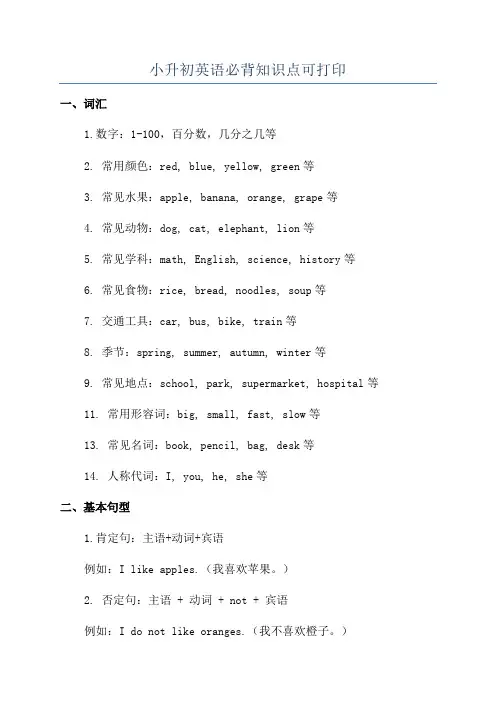
小升初英语必背知识点可打印一、词汇1.数字:1-100,百分数,几分之几等2. 常用颜色:red, blue, yellow, green等3. 常见水果:apple, banana, orange, grape等4. 常见动物:dog, cat, elephant, lion等5. 常见学科:math, English, science, history等6. 常见食物:rice, bread, noodles, soup等7. 交通工具:car, bus, bike, train等8. 季节:spring, summer, autumn, winter等9. 常见地点:school, park, supermarket, hospital等11. 常用形容词:big, small, fast, slow等13. 常见名词:book, pencil, bag, desk等14. 人称代词:I, you, he, she等二、基本句型1.肯定句:主语+动词+宾语例如:I like apples.(我喜欢苹果。
)2. 否定句:主语 + 动词 + not + 宾语例如:I do not like oranges.(我不喜欢橙子。
)3.疑问句:特殊疑问词+助动词/助动词+主语+动词+宾语例如:What do you like?(你喜欢什么?)4.一般疑问句:助动词/助动词+主语+动词+宾语例如:Do you like bananas?(你喜欢香蕉吗?)5. 答语:肯定回答:Yes, 主语 + 动词。
否定回答:No, 主语 + do/does not + 动词。
例如:Yes, I do. / No, I do not.三、时态1. 一般现在时:I/you/we/they + 动词原形,he/she/it + 动词原形 + s/es例如:I like to swim.(我喜欢游泳。
)2.一般过去时:主语+动词过去式例如:They played basketball yesterday.(他们昨天打篮球。
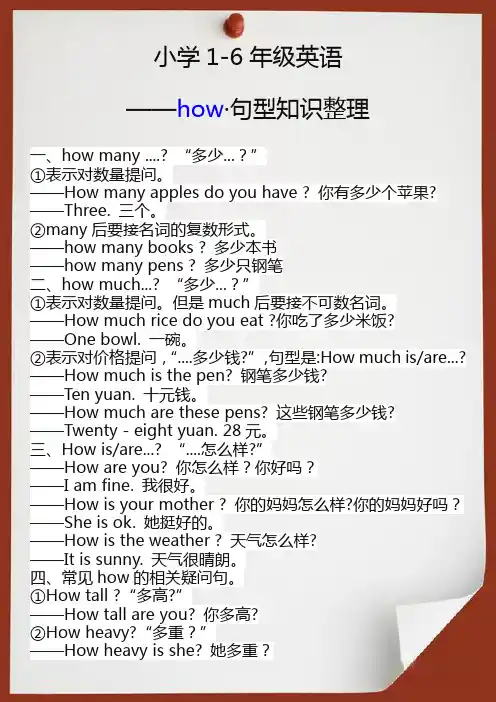
小学1-6年级英语——how·句型知识整理一、how many ....? “多少...?”①表示对数量提问。
——How many apples do you have ? 你有多少个苹果? ——Three. 三个。
②many后要接名词的复数形式。
——how many books ? 多少本书——how many pens ? 多少只钢笔二、how much...? “多少...?”①表示对数量提问。
但是much后要接不可数名词。
——How much rice do you eat ?你吃了多少米饭? ——One bowl. 一碗。
②表示对价格提问,“....多少钱?”,句型是:How much is/are...? ——How much is the pen? 钢笔多少钱?——Ten yuan. 十元钱。
——How much are these pens? 这些钢笔多少钱? ——Twenty - eight yuan. 28元。
三、How is/are...? “....怎么样?”——How are you? 你怎么样?你好吗?——I am fine. 我很好。
——How is your mother ? 你的妈妈怎么样?你的妈妈好吗?——She is ok. 她挺好的。
——How is the weather ? 天气怎么样?——It is sunny. 天气很晴朗。
四、常见how的相关疑问句。
①How tall ?“多高?”——How tall are you? 你多高?②How heavy?“多重?”——How heavy is she? 她多重?③How old?“多大年龄?”——How old are your parents? 你的父母年龄多大了?小学1-6年级英语——how·句型知识整理一、how many ....? “多少...?”①表示对数量提问。
——How many apples do you have ? 你有多少个苹果? ——Three. 三个。
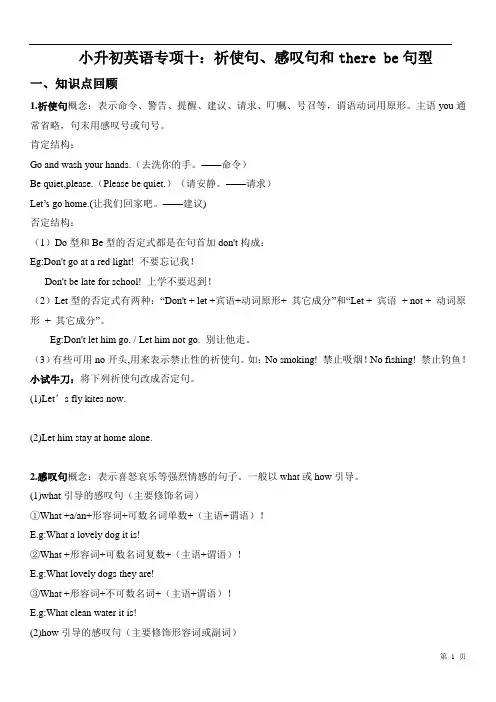
小升初英语专项十:祈使句、感叹句和there be句型一、知识点回顾1.祈使句概念:表示命令、警告、提醒、建议、请求、叮嘱、号召等,谓语动词用原形。
主语you通常省略,句末用感叹号或句号。
肯定结构:Go and wash your hands.(去洗你的手。
——命令)Be quiet,please.(Please be quiet.)(请安静。
——请求)Let’s go home.(让我们回家吧。
——建议)否定结构:(1)Do型和Be型的否定式都是在句首加don't构成:Eg:Don't go at a red light! 不要忘记我!Don't be late for school! 上学不要迟到!(2)Let型的否定式有两种:“Don't + let +宾语+动词原形+ 其它成分”和“Let + 宾语+ not + 动词原形+ 其它成分”。
Eg:Don't let him go. / Let him not go. 别让他走。
(3)有些可用no开头,用来表示禁止性的祈使句。
如:No smoking! 禁止吸烟!No fishing! 禁止钓鱼!小试牛刀:将下列祈使句改成否定句。
(1)Let’s fly kites now.____________________________________________________________________(2)Let him stay at home alone.____________________________________________________________________2.感叹句概念:表示喜怒哀乐等强烈情感的句子。
一般以what或how引导。
(1)what引导的感叹句(主要修饰名词)①What +a/an+形容词+可数名词单数+(主语+谓语)!E.g:What a lovely dog it is!②What +形容词+可数名词复数+(主语+谓语)!E.g:What lovely dogs they are!③What +形容词+不可数名词+(主语+谓语)!E.g:What clean water it is!(2)how引导的感叹句(主要修饰形容词或副词)How +形容词/副词+(主语+谓语)!E.g:How fast he runs!有关感叹句的选择题或填空题————做题方法(1)先找主语和谓语(一般先确定谓语动词)有名词①可数名词单数——what a/an(2)再看主语前有无名词②可数名词复数③不可数名词what无名词———how小试牛刀:用what或how填空。
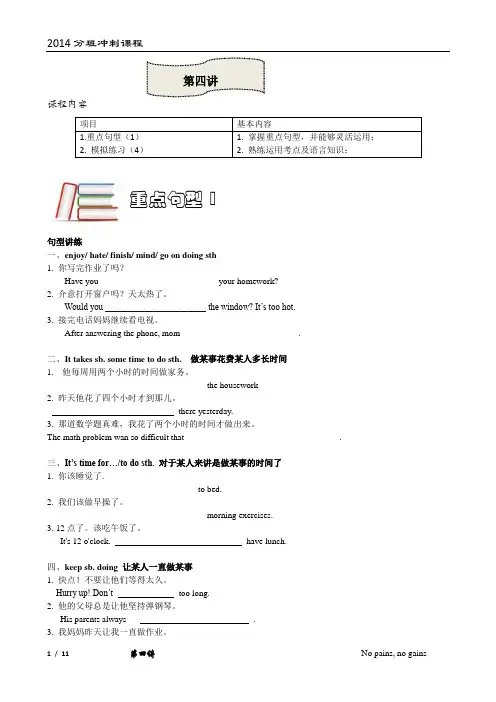
课程内容句型讲练一、enjoy/ hate/ finish/ mind/ go on doing sth 1. 你写完作业了吗?Have you _________________________ your homework? 2. 介意打开窗户吗?天太热了。
Would you _______________________ the window? It’s too hot. 3. 接完电话妈妈继续看电视。
After answering the phone, mom __________________________ .二、It takes sb. some time to do sth. 做某事花费某人多长时间 1. 他每周用两个小时的时间做家务。
____________________________________ the housework 2. 昨天他花了四个小时才到那儿。
___ there yesterday.3. 那道数学题真难,我花了两个小时的时间才做出来。
The math problem wan so difficult that ___________________________________.三、It’s time for…/to do sth. 对于某人来讲是做某事的时间了 1. 你该睡觉了.__________________________________ to bed. 2. 我们该做早操了。
____________________________________ morning exercises. 3. 12点了。
该吃午饭了。
It's 12 o'clock. _________ have lunch.四、keep sb. doing 让某人一直做某事 1. 快点!不要让他们等得太久。
Hurry up! Don’ttoo long.2. 他的父母总是让他坚持弹钢琴。
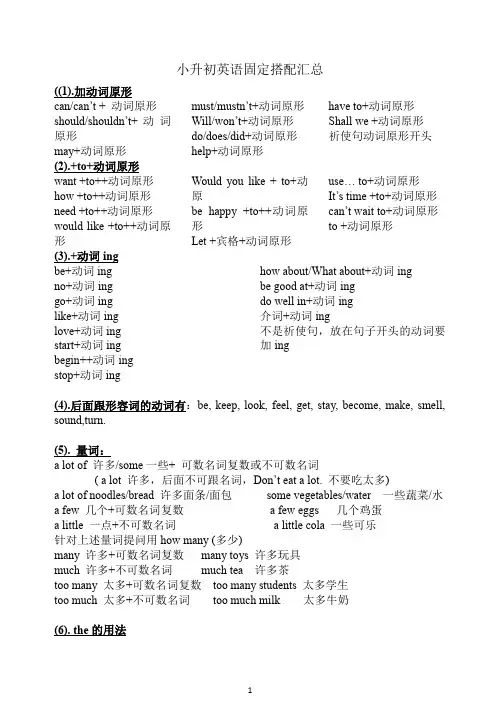
小升初英语固定搭配汇总((1).加动词原形can/can’t + 动词原形should/shouldn’t+动词原形may+动词原形must/mustn’t+动词原形Will/won’t+动词原形do/does/did+动词原形help+动词原形have to+动词原形Shall we +动词原形祈使句动词原形开头(2).+to+动词原形want +to++动词原形how +to++动词原形need +to++动词原形would like +to++动词原形Would you like + to+动原be happy +to++动词原形Let +宾格+动词原形use… to+动词原形It’s time +to+动词原形can’t wait to+动词原形to +动词原形(3).+动词ingbe+动词ingno+动词inggo+动词ing like+动词ing love+动词ing start+动词ing begin++动词ing stop+动词ing how about/What about+动词ingbe good at+动词ingdo well in+动词ing介词+动词ing不是祈使句,放在句子开头的动词要加ing(4).后面跟形容词的动词有:be, keep, look, feel, get, stay, become, make, smell, sound,turn.(5). 量词:a lot of 许多/some一些+ 可数名词复数或不可数名词( a lot 许多,后面不可跟名词,Don’t eat a lot. 不要吃太多)a lot of noodles/bread 许多面条/面包some vegetables/water 一些蔬菜/水a few 几个+可数名词复数 a few eggs 几个鸡蛋a little 一点+不可数名词 a little cola 一些可乐针对上述量词提问用how many (多少)many 许多+可数名词复数many toys 许多玩具much 许多+不可数名词much tea 许多茶too many 太多+可数名词复数too many students 太多学生too much 太多+不可数名词too much milk 太多牛奶(6). the的用法1. 球类前面不加the play football/table tennis 踢足球/打乒乓球2. 月份前面不加the in January/February 在一月/在二月3. 乐器前面加the play the piano/guitar 弹钢琴/吉他4. 四个传统节日加the the Spring Festival 春节Dragon Boat Festival 端午节Mid-Autumn Festival 中秋节Double Ninth Festival 重阳节5. holiday 前加the the National Day holiday 国庆节(on holiday 度假中,没有the )6. 景点前加the the Bund (上海)外滩the Shanghai Museum 上海博物馆the Great Wall 长城the Palace Museum 故宫the Summer Palace 颐和园(Tian’anmen Square 前面不加the)7. 序数词前加the on the second floor 在二楼the third girl第三个女孩日期:the +序数词+of +月份8. 其他the next day 第二天(7)in 的用法1. 在…里/上in the kitchen 在厨房in the forest 在森林里in the playground 在操场上in the tree 在树上(指不长在树上) the apples on the tree 树上的苹果on the tree 在树上(指长在树上的) the monkeys on the tree 树上的猴子2. 时间in the morning/afternoon/evening 在早上/下午/晚上in May / June 在五月/六月in three days 三天内in the future 在将来/未来3. 其它in a healthy diet 在健康的饮食in your meals 在你的餐点中go in 进入in front of 在…前面(方位上的) before 在……之前(时间上的) in front of the house 房子前面before bedtime 睡前(8)on的用法1. 某一天前用on1) on Monday/Tuesday/Wednesday/Thursday 在周一/周二/周三/周四2) on the second of March 在三月二日3) on Mother’s Day 在母亲节4) on your birthday 在你生日2. 某一天的早中晚on Friday morning在周五早上on Saturday afternoon在周六下午on Sunday evening在周日晚上on Chinese New Year’s Eve 在除夕夜3. 其它on your left/right 在你左边/右边put on 穿上(take off 脱下)put on a play 上演/表演一出戏try on 试穿get on 上车(get off下车)from then on 从那时起go on 继续(go well 进展顺利)(9)at的用法1.时间at eleven (o’clock) 在十一点at night 在夜里at weekends 在周末at a time 一次at Christmas 在圣诞节at Chinese New Year 在中国新年at this festival 在这个节日at first 起先,最初at last 最后2. 地点at school 在学校at home 在家at Mike’s house 在麦克家at the party 在派对at a snack bar 在小吃店at a shopping centre 在购物中心at Park Station 在公园站at the train station 在火车站at the bus stop在公交车站at the traffic lights 在交通信号灯处at the school gate 在校门口3. 其它point at…指着,指向point at the king 指着国王laugh at 笑,大笑(laughed过去式) laugh at me 笑我shout at 朝……喊shout at that old man 朝那个老人喊(10)V. sb. sth.=V. sth. to sb.1. show sb. sth. = show sth. to sb. 给某人看某物/向某人展示某物show me your new clothes=show your new clothes to me 为我看你的新衣服2. give sb. sth. =give sth. to sb. 给某人某物/把某物给某人give him a book = give a book to him 给他一本书/把一本书给他3. send an email to her = send her an email 给她发封邮件/发封邮件给她4. write letters to them = write them letters 给他们写信/写信给他们(11)句型What ….? 询问什么,用具体的事情回答。
小升初英语最常考的八大句型1.So+be/助动词/情态动词/主语。
前面陈述的肯定情况也适于另一人(物)时,常用到这种倒装结构,表示"另一人(物)也如此。
"前面陈述的否定情况也适于另一人(物)时,常用"Neither/Nor+be/助动词/情态动词+主语。
"这种倒装结构。
注意:"So+主语+be/助动词/情态动词。
"这一句型常用于表示赞同,进一步肯定对方的看法,表示"的确如此。
""是呀。
"2.Turn right/left at the first/second/…crossing.这一指路的句型意为"在第一/二/……个十字路口向右/左拐。
"相当于Take the first/second/…turning on the right/left.3.It takes sb.sometime to do sth.此句型表示"干某事花了某人一段时间。
"其中的it 是形式主语,后面的动词不定式(短语)才是真正的主语。
4.…think/find+it+adj.+to do sth.此句型中的it是形式宾语,不可用其它代词替代,形容词作宾语的补足语,后面的动词不定式(短语)才是真正的宾语。
5.What's wrong with…?此句型相当于What's the matter/trouble with…?后跟某物作宾语时,意为"某物出什么毛病了?"后跟某人作宾语时,意为"某人怎么了?"6.too…to…在so…that…复合句中,that后的句子是否定句时,常与简单句too…to…(太……而不能……)进行句型转换。
在so…that…复合句中,that后的句子是肯定句时,常与简单句…enough to…进行句型转换。
7.Sorry to hear that.全句应为I'm sorry to hear that.意为"听到此事我很难过(遗憾)。
小升初英语复习资料:小学英语70个必背重点句型为了帮助学生考取更多的分数,小磊哥特地为大家收罗了小升初英语70个重点句型,希望对同学们有所帮助。
1.allow sb to do sth 允许某人去做某事(后接动词不定式)My father allowed me to go out for a walk after finishing my homework.2.asked sb (not) to do sth 叫某人做事某事(叫某人不要去做某事)My father asked me to study hard.He asked me not to swim alone.be asked to do sth 被叫去做某事/被邀请去做某事I was asked to have a dinner with them yesterday.3.be afraid to do sth 害怕做某事She is afraid to ask me questions.4.be afaid of doing sth 害怕做某事I am afraid of going out at night.5. be afaid of sth 害怕某物He is afraid of snakes.6. be amazed to do sth 对做某事感到惊讶He was amazed to meet the girl there.be amazed at sth 对某事感到惊讶they were amazed at the news.7.be busy doing/with sth 忙于做某事(常考)I was busy washing my car at that time. 那时候我正忙于清洗我的车子。
I am busy with my work.8.becoming/going/leaving/fiying/moving/dying(某些位移动词用进行时态时表将来)the bus is coming/the dog is dying.9.be excited to do sth 对做……感到兴奋Jacky was excited to travel there by plane.be excited at sthLily was excited at his words.be excited about doing sthhe was excited about passing the exam without going overing books.10.be frightened to do sth 害怕去做某事Sam is frightened to ride a horse.11.be glad/happy to do sth 高兴去做某事She is happy to clean theblackboard with me.be pleased to do sth高兴做某事She was pleased to helpthe old man yesterday.be pleased with sth 对某事感到高兴/满意The teacher was pleasedwith my answer.12.be interested in sth/doing sth 对某事感兴趣/对做某事感兴趣She is interested inswimming in the river.My btother is interestedin Chinese.13.be/get ready for/to do sthbe ready for 为某事做好了准备We are ready for the exam.Be ready to do sth 为做某事做好了准备We are ready to have a birthday party for her.get ready for sth为某事在做准备We are getting ready for the exam.14.be surprised to do sth 对做某事感到惊奇be surprised at sth 对某事感到惊奇This is nothing to be surprised at.I'd be surprised to see him on such an occasion.15.be worth doing sth 值得做某事(worth 后接动词-ing形式,常考)It was too remote to be worth thinking about.16.开始去做某事begin to do sth begin/start to do/doing sth When do children begin to go to school?17. can/be able to afford (to buy) sth 有能力负担(购买)……At this rate we won't be able to afford a holiday.18.can/may/must do sth could/would/should/might do sth We may come at another time.19.can't wait todo sth 迫不急待地去做某事I can’t wait to hear the news.20.decide to do sth 决定去做某事make up one's mind to do sth 下决心去做某事(常考)make a decision to do sth 对做某事作出决定What do they decide to do?I have made up my mind to go with him21. deserve to do sth 值得/应该做……We must admit that she did deserve to win.22.encourage sb to do sth 鼓励某人去做某事Encourage them to do some other helpful recreations.23.enjoy doing sth 喜欢去做某事I enjoy reading the story book24.expect (sb) to do sth 期望去做某事Don't expect him to help you.25. fail to do sth 做某事失败succeed doing sth 成功做了某事If you don' t work, you willfail to pass the exam.26.finish doing sth 做完某事(后接动词-ing形式)(常考)After finish doing your homework, you can have a rest.27.follow sb to do sth 跟随某人去做某事Follow me to read the new words.28.get sb to do sth / make sb do sth/ let sb do st 让某人做某事(后接动词原形)Her jokes made us laugh.29.get/have a chance to do sth 得到一个做某事的机会I'm very happy to have a chance to visit your school.30.give/pass/show/lend/sell sb sth/sth to sbbuy/get/bring sb sth/sth for sbPlease give me a piece of paper.I bought him a drink in return for his help.31.go on to do sth /go on doing sth 继续做事(常考) Go on doing the exercise after a short rest.32.hate to do/doing sth 讨厌/不喜欢做某事Ihate to tell the news to you.33. have fun doing sth 做某事很有趣Have fun getting to know each other.34.have problems doing sth 做某事遇到困难Many people have problems getting to sleep at night.35. have sb do sth/have sth done 让某人做某事This is the best work you have ever done.36.hear sb do sth 听到某人做某事(后接动词原形,常考) hear sb doing sth 听到某人正在做某事(常见)I heard someone laughing.37.help to do sth 帮忙做某事help sb (to) do sth 帮助某人做某事I'll help you clean the room.38.hope/wish to do sth 希望做某事wish sb to do sth 希望某人做某事I wish to take this opportunity to thank you all.39.It seems that 这像是……(后接从句)seem to do sthseem +adjIt'seems that you are lying.Does that seem to make sense?40. It's + adj+(for sb) to do sth .It's+adj +(of sb) to do sthIt's glad for him to hear the news.41.It takes sb sometime/money to do sth . 花费某人多长时间做某事(常考) It takes me an hour to walk there and back.42.pay …for…cost spend…on….. it take …to do sth 花费He paid for it out of his own pocket.43.It's best for sb to do sth. 对某人来说做某事是最好的It's best for you to do more exercise.had better do sth 最好做某事(注意had没有时态和人称的变化,better后接动词原形)You had better go to the school.44.It's time for sb to do sth 是某人做某事的时候了It's time for us to have dinner.45.keep (on)doing sth 坚持做某事(常考)John always kept (on) asking questions.keep sb doing sth 让某人做某事(常考)Don't keep me waiting.keep sb from doing sth 阻止某人做某事(常考)He keeps her from cutting the tree.keep sb/sth +adj 使某人保持……的状态Washingyour hands keeps you healthy.46.learn to do sth 学做某事I learn to play football.learn sth from sb 向某人学习I learn the spirit from him47.like to do/doing sth 喜欢做某事like sb to do sth 喜欢某人做某事She likes swimming./She likes to swim this afternoon.48.need to do sth/ need doing sth/need to be done 需要做某事The garden needs to be watered. / The garden needs watering.49. prefer to do sth rather than do sth 宁愿……而不愿……(常考)I would prefer to spend the weekend at home rather than drive out. prefer doing sth to doing sth 喜欢做……胜过做……I prefer reading books to going shopping. 比起购物来,我更爱读书。
小学常见的其他基本句型❺综合练习一,用some, any填空1.There's water in the cup. There isn't tea in the cup.2.— Is there bread here? —Yes, there is. There's on the table.3.Are there cars in front of the building? No, there aren't.4.There isn't chocolate on the table.5.Is there soap on the dressing table?二.用适当的there be形式填空5. () Take me some oranges.l._ a spoon on the plate.2._3._ some milk on the table.some coffee, too. some clouds in the sky.some boats on the river.4._________any knives in the box?5.________ a newspaper in the living room?6.________ any books in the room? Yes,.7.________ any magazines on the television? No,.8.________ 5() minutes in an hour.9.________ a pencil, a ruler and 2 books on the desk.10. 2 glasses and a cup on the table?三.选择与画线部分意思最接近的选项1.() How much are your books?A. do your books costB. have your books2.() How are you? Fine, thank you.A. Very goodB. Very happy3.() Thank you very much. You are welcome.A. That's all rightB. Let me see4.() I am free today.A. not tallB. not emptyC. do your books take C. Very wellC. Nice to meet you C. not busyA. Take some oranges to meB. Take some oranges for meC. Take some oranges with me6. () I walk to the office every day.A. go to the office bybusB. go to the office onfoot7.() Have a good time, children.A. Have a nice cakeB. Enjoy yourself() I want to have some coffee.A. I'dlikeB. I'mlike9. () Be quiet, Danny.A. Don't make anoiseB. Be careful10.() Look! An aeroplane is flying above the mountain.A. at the top ofB. on四.根据实际情况回答问题1. Were you in the classroom this morning?C. go to the office by carC. Play with yourselfC.I hkeC. Take careC. over2. Was there any ink in your pen?3. What day is it today?4. What day was yesterday?5. When is your birthday?6. What time did you come to school this morning?7. Can you fly a kite in autumn?8. How do you get to the market?五.根据答案写出问题Yes, Sam was outside the police station.1. ___________________________________________ S he was in the theatre at eight o' clock.3. __________________________________________I like all the dinosaurs.4.___________________________________________Four girls have a computer.5.___________________________________________There is a little.6.___________________________________________Both of them can.7.___________________________________________We did our best to work out the problems an hour ago.8.___________________________________________There were some birds and owls in the tree.六.根据所给语境,选择适当的答案,将其序号填入题前括号内1.()当别人对你说:Your English is very nice!你可以说:A. Of course.B. Not at all.C. Thank you.2.()当你上学迟到时,你可以这样对老师说:A. It doesn't matter.B. I'm sorry. Tm late.C. That's all right.3.()当别人对你说:Would you like to come to my birthday party?你可以说:A. Sure.B. Good night.C. No.4.()当别人对你说:What's the date today?你可以说:A. Today is Monday.B. It's my birthday.C. It's August 6.5.()当别人对你说:WhaTs your job?你可以说:A. I'm Kate.B. I'm a doctor.orC. Fm Li Ming's mum.6.()当别人对你:Let's go skating你不想去,可以说:A. Sorry, 1 can'tB. OK, let's go.C. That's a good idea.7.()当你的朋友说:I've got a bad cough.你可以说:A. I'm sorry to hear that.B. How are you?C. How do you do?8.()开学后,老师第-次见到同学们,会说:A. Whats your name?B. Welcome back to school, boys and girls.C. Goodbye, boys and girls.七.阅读短文,选择填空(一)Look! The lady1_white is Miss Yang. She is a _2. Miss Yang _3in the library ofMoon Middle School.She loves her work because she loves _4. In the library she has got many books—5 different _6 She is very helpful. She is very strict (严格).Everybody 7_ return the books1.( )A. with B. in C. at2.( )A. librarian B. policewoman C. teacher3.( )A. work B. works C. working4.( )A. books B. school C. students5.( )A. for B. on C. of6.( )A. books B. subjects C. students7.( )A. must B. may C. can8.( )A.in time B. at time C. on time(-)Monday is the first work day of the week for most Chinese people and it is also the first school day of the week. On Monday morning men and women go to work. Today is Monday. It is raining. Look! Some people are walking. Some are riding their bicycles. Some are waiting for buses at the bus stop in the rain. Others are driving their cars. The streets are full of cars and buses.1.() Monday is the first of the week.A. walk dayB. work dayC. week day2.() It is today.A. windyB. rainyC. sunny3.() There are cars and buses in the street.A. manyB. someC. much4.()is the first school day of the week.A. SundayB. TuesdayC. Monday综合练习参考答案及提示一、1. some,any 2.any,some 3.any 4.any 5. any二、1. There is 2. There is, There is 3. There are. Thereare 4. Are the 5. Is there6. Are there, there are7.Are here , there aren't8. There aren't9. There's 10. Are there 三、l.A 2.C3.A4.C5.A6.B7.B8.A9.A 10.C四、1. Yes.I was 2.Yes, there was. 3.It's Tuesday. 4.1 was Monday.5. It's in June6. I came to school at half past seven.7.Yes. I can.8. I get to the market on foot.(提示: 以上答案不是唯一的)五、1. Was Sam outside the police station? 2. Where was she at eight o'clock?3. Which dinosaur do you like?4. How many girls have a computer?5. How much honey is there in the bowl?6. Which boy can swim, Sandy or Charlie?7. What did you do? 8. What was in the tree?六、l.C 2.B 3.A 4.C 5.B 6.A 7.A 8.B七:(一)1.B2.A 3.B4.C5.B 6.B 7.A 8.A(二)1.B 2.B 3.A4.C。
小升初英语重点短语句型语法一、重点短语library 图书馆post office 邮局hospital 医院cinema 电影院bookstore 书店science museum 科学博物馆turn left 向左转turn right 向右转go straight 直行north 北south 南east 东west 西next to 靠近、与……相邻then 然后二、重点句型1.Where is the cinema, please? 请问电影院在哪里?2.It’s next to the hospital.它与医院相邻。
3.Turn left at the cinema, then go straight.It’s on the left.在电影院向左转,然后直行。
它在左边。
重点语法1.问路时要用"excuse me 对不起,打扰一下"2.描述路时可以用顺序词:first首先,next接着,then然后3.near 表示在附近,next to 表示与…相邻,它的范围比near小。
in front of 在。
前面 behind 在……后面4.在左边,在右边介词要用on, on the left/on the right,但是东西南北,介词要用in,in the north/east/south/west.5.for 表示持续多长时间,当表示做某事多长时间都要用for.如:Walk east for 5 minutes.Then walk straight for three minutes.6.乘几路车可以用by the No.301 bus,注意No.中N要大写,后面要加点。
如果要用动词可以用take,例如take the No.301 bus.7.当表示某个地方在另一个地方的哪一方向时,要用介词of。
如:the hospital is east of the cinema.医院在电影院的东边。
专题句型一、句型句子第一个单词的首字母要大写,句末要有句号、问号、感叹号或省略号等标点符号。
小学阶段主要学习简单句。
二、简单句的基本句型(一)主语+系动词+表语The bike is new.The music sounds beautiful.(二)主语+谓语He runs in the morning.(三)主语+谓语+宾语Tom likes maths.(四)主语+谓语+双宾语(间接宾语+直接宾语)His father bought him a big kite.(五)主语+谓语+宾语+宾语补足语His mum found him very sad.We hear somebody singing.三、句子分类根据语气和表达方式可以将句子分为陈述句、疑问句、感叹句、祈使句和倒装句。
(一)陈述句用来说明一个事实的句子叫陈述句。
它有肯定式和否定式两种形式。
1.陈述句的肯定式:He is a primary school student.I have a hammer in my hand.She teaches us music.2.陈述句的否定式:(1)谓语动词如果是be、助动词、情态动词时,在它们的后面直接加“not”。
如:My brother is not a teacher.He does not have a cousin.I will not go there tomorrow.My mother is not cooking a meal in the kitchen.You must not smoke here again.We haven’t reached there yet.(2)谓语动词如果没有上述词语而是其他动词时,需要借助do/does/did+not+动词原形来变否定形式,如:I don’t know anything about it.Li Ming does not play football after school.We didn’t have a meeting yesterday afternoon.【连词成句】讲解做题技巧。
专题12 四大句型(陈述句、疑问句、祈使句和感叹句)(一) 陈述句一、陈述句的概念陈述是用于陈述事实和观点的句子,句末用句号如:He gets up at seven. 他七点钟起床。
(陈述事实)I don't think so. 我不这么认为。
(陈述观点)二、陈述句的分类1. 陈述句的肯定式①主语+系动词+表语如:This is my brother. 这是我哥哥。
Li Ming and Li Hua are good friends. 李明和李华是好朋友。
②主语+谓语+其他成分如:I read books on Sundays. 我在星期天读书。
He plays football every day. 他每天都踢足球。
2. 陈述句的否定式① be动词的否定式:在be动词后面直接加not如:I am a student. → I am not a student.He is reading. → He isn't reading.They are working. → They are not(aren't) working.②情态动词的否定式:在情态动词后面直接加not如:He can dance. → He can not (can't) dance.You should go to bed early. → You should not (shouldn't) go to bed early.③实义动词的否定式:在实义动词前加don't、doesn't或者didn't如:I like pop music. →I do not (don't) like pop music.He likes running. →He does not (doesn't) like running.He went to the zoo yesterday. →He did not (didn't) go to the zoo yesterday.基础闯关(限时10分钟满分10分)一、按要求写句子。
小升初英语常考句型1. Hello! Hi!2. Hello! I’m Wu Yifan. I’m from China.3. What’s your name?4. My name’s Chen Jie.5. I have a pencil. Me too.6. Good morning. Good afternoon.7. This is Miss White. Nice to meet you.8. Where are you from? I’m from America.9. Let’s go to school. OK.10. . How many cakes? One cake11. How are you? I’m fine, thank you.12. Let’s paint. Great13. I like green. Me too.14. I have a rabbit.15. Cool! Super! Great! Wow!16. May I have a look? Sure.17. Here you are. Thank you. You’re welcome18. I like hamburgers. Me too19. Have some French fries.20. Can I have some chicken? Sure.21. How old are you? I’m nine.1. Where are you from? I’m from America.2. Good morning! Good afternoon!3. Class, we have a new friend today.4. Who’s that woman? She’s my mother。
5. Who’s that man? He’s my father.6. Who’s this boy? My brother.7. I have a new kite. Oh, it’s beautiful.8. How many kites can you see? I can see 12.9. The black one is a bird. Oh, how nice!10. How many crayons do you have? I have 16 crayons.11. Open it and see. That’s right.12. Do you like peaches? Yes, I do. /No, I don’t.13. What about pears? Oh, I like them very much.14. Let’s have some peaches and pears.15. Have some fruits. Thank you, Miss White.16. Sorry, I don’t like bananas.17. Can I have an apple, please? Certainly.18. Have some more? No, thank you.19. Where is my car? It’s under the chair.20. Excuse me. Can I use your pencil? No problem.21. Here you are. Thank you!22. Come on, children. Look at the elephant.23. Wow! It’s so big! It’s so funny!24. It has a long nose and a short tail.25. It has small eyes and big ears.26. Look at the giraffe. Oh, it’s so tall.27. The giraffe is tall. The deer is short.28. You’re tall. I’m short. You’re right.29. Let’s fly it. OK.30. What a big fish!四年级上册句子1. What’s in the classroom?2. This is Zhang Peng, our new classmate.3. We have a new classroom.4. Where is my seat? It is near the door.5. Let’s clean the classroom. Good idea!6. Let me clean the board. All right.7. It is nice and clean! Good job!8. What colour is the schoolbag? It‘s black and white.9. May I have a look? Sure. Here you are.10. My schoolbag is heavy.11. What is in the schoolbag?12. How many picture-books do you have?13. My friend is strong. He has short hair….14. I have a new friend. He likes sports. She likes music.15.What’s his name ? His name is Zhang Peng.16. What’s her name ? Her name is Amy.17. Is this your bedroom? Yes, it is./No, it isn’t.18. I have a new eraser.19. Is she in the study? No, she isn’t. She’s in the kitchen.20. Where are the keys? They are in the door.21 Are they on the table? No, they aren’t.22. What’s for dinner? Rice, fish and vegetables.23. What would you like for dinner? I’d like some rice and soup.24. Everything’s ready. Thanks /Thank you.25. Dinner’s ready! Your forks and knives.26. Help yourself! Thank you.27. I can use chopsticks. Let me try.28. Mm…Yummy, I like Chinese food. Me too.29. We had a good time. See you tomorrow.30. How many people are there in your family? Three.31. Who are they? My parents and me.32. My family has seven members.33. Who’s this man? He’s my uncle.34. Who’s this woman? She’s my aunt.35. Is this your aunt? Yes, she is. /No, she’s my sister.36. What’s your mother? She’s a teacher.37. What’s your father? He’s a doctor.38. Are they farmers? Yes, they are. / Yes, you’re right. 四年级下册句子1. Where is the canteen? It’s on the first floor.2. This is the teacher’s office. That is my classroom.3. How many students are there in your class? Forty-five.4. Do you have a library? Yes!5. The canteen is on the first floor.6. This is my computer. That is your computer.7. Is this a teacher’s desk? Yes, it is.\No, it isn’t.8. Is that the art room? Yes, it is.\No, it isn’t.9. What time is it? It’s nine o’clock.10. It’s time for English class. Breakfast is ready!11. School is over. Let’s go to the playground.12. Let’s go home. I’m ready.13. It’s 7:05. It’s time to go to school.14. It’s 8:30 .It’s time for music class.15. I like the white sweater with the green skirt.16. I like the blue dress.17. Where is my skirt?18. What color is it? Blue.19. Is this your skirt? Yes, it is./No. it isn’t. My T-shirt is red.20. Is that your T-shirt? No, it’s not.21. Whose is it? It’s my T—shirt.22. Whose is this? It’s your baby brother’s!23. What are they? These are your baby pants. They’re so small.24. Are those my shoes? Yes. But what for?25. Our neighbor has a new baby!26. This is the weather report. It’s cool in Lhasa.27. Can I wear my new shirt today? No, you can’t. /Yes, you can.28. It’s warm today. You can wear your new shirt.29. Can I wear my T-shirt? Yes, you can.30. What are you doing? Not much.31. What’s the weather like in Beijing? It’s rainy today.32. How about New York? It’s sunny.33. What’s the matter?34. It’s windy now. I have to close the window.35. Look at that dress. It’s colorful. It’s very pretty.36. Can I help you? Yes.37. How much is this dress? It’s ninety-nine Yuan.38. What size? Size five.39. Are they all right? Yes, they are.40. How much are they? They’re thirty-five Yuan.41. What are they? They are goats.42. Are they sheep? No, they aren’t. They are goats.43. Are they horses? No, they aren’t .They are donkeys.44. Look at the hens. They are fat.45. How many cows do you have? One hundred.46. What do you see in the picture? I see five cats.47. Are these tomatoes? Yes, they are. /No, they aren’t.48. What are these? They are carrots.五年级上册句子1. Who’s your math teacher? Mr. Zhao.2. What’s he like? He’s thin and short. He’s very kind.3. Who’s that young lady? She’s our principal.4. Is she strict? Yes, she is.5. Is she active? No, she isn’t. She’s quiet.6. I have a new math teacher. Her class is so much fun.7. What day is it today? It’s Monday.8. What do you have on Wednesdays?9. We have English, science, computer and P.E..10. What do you do on Saturdays?11. I often do my homework.12. What about you? I do my homework too.13. What would you like for lunch? I’d like some tomatoes and mutton.14. What do you have for lunch today?15. I have eggplant and tomatoes.16. It’s tasty. It’s my favorite.17. What’s your favorite food? Fish.18. I don’t like grapes. They’re sour.19. Are you helpful at home? You’re helpful.20. What can you do? I can sweep the floor.21. Just do it!22. Can you set the table? Yes, I can. No, I can’t.23.I have my own room now.24. What’s it like?25. There is a big closet, a new air-conditioner and a new mirror.26. There are blue curtains.27. Where is the trash bin? It’s near the table.28. There is a forest in the nature park.29. Is there a river in the park? Yes, there is. No, there isn’t.30. There are many small houses in my village.31. Are there any bridges in your village? Yes, there are.32. Are there any tall buildings in your village? No, there aren’t.五年级下册句子1. When do you eat dinner? I eat dinner at 7:00 in the evening.2. When do you get up? I usually get up at 12:00 noon.3. What do you do on the weekend?4. Usually I watch TV and go shopping. Sometimes I visit my grandparents.5. I often play football. Sometimes I go hiking.6. What’s your favorite season? Winter.7. Which season do you like best? Fall.8. It’s always sunny and cool.9. I can play with snow.10. Why do you like spring? Because I can plant trees.11. When is your birthday? My birthday is in June.12. Is your birthday in June, too? No. My birthday is in December.13. It’s October 1st, our National Day.14. Who has a birthday in October? Me.15. What’s the date? It’s October 1st.16. What are you doing? I an doing the dishes.17.What is your father doing? He’s writing an e-mail.18. This is Nina. Can I speak to your mom, please?19. Please hold on. There’s a call for you.20. I see the mother elephant.21. What is she doing? She is walking.22. What about the baby elephant?23. What is it doing? It’s running.24. What are the elephants doing? They’re drinking.25. What is Mike doing? He’s watching insects.26. What are you doing? I’m watching my classmates.27. Where are they? They are in the woods.28. Are they catching butterflies? No, they aren’t. /Yes, they are.29. Where is Zhang Peng? He’s in the woods.30. Is he taking pictures? Yes, he is. /No, he isn’t.六年级上册句子1. How do you go to school, Sarah?ually I go to school on foot.3.Sometimes I go by bike.4.How can I get to Zhongshan Park?5.You can go by the No.15 bus.6.Where is the cinema, please?7.It’s next to the hospital.8.Turn left at the cinema, then go straight. It’s on the left.9.What are you going to do on the weekend?10. I’m going to visit my grandparents this weekend.11.Where are you going this afternoon? I’m going to the bookstore.12.What are you going to buy? I am going to buy a comic book.13.What’s your hobby? I like collecting stamps.14. He likes collecting stamps, too.15.Does she teach English? No, she doesn’t.16. Does she teach you math? Yes, she does.17.What does your mother do? She is a TV reporter.18.Where does she work? She works in a school.19. How does she go to work? She goes to work by bus.20.Where does the rain come from? It comes from the clouds.21. How do you do that? What should you do then?六年级下册1.How tall are you? I’m 164 cm tall.2. You’re shorter than me. You’re 4 cm taller than me.3.How heavy are you? I’m 48 kg.4. I’m thinner and shorter than you5.What’s the matter? My throat is sore.6.My nose hurts.7. How are you, Liu Yun? You look so happy.8.How are you, Sarah? You look sad today.9.What did you do last weekend? I played football.10. Did you read books? Yes, I did. / No, I didn’t.11.Where did you go on your holiday? I went to Xinjiang.12.How did you go there? I went by train.。